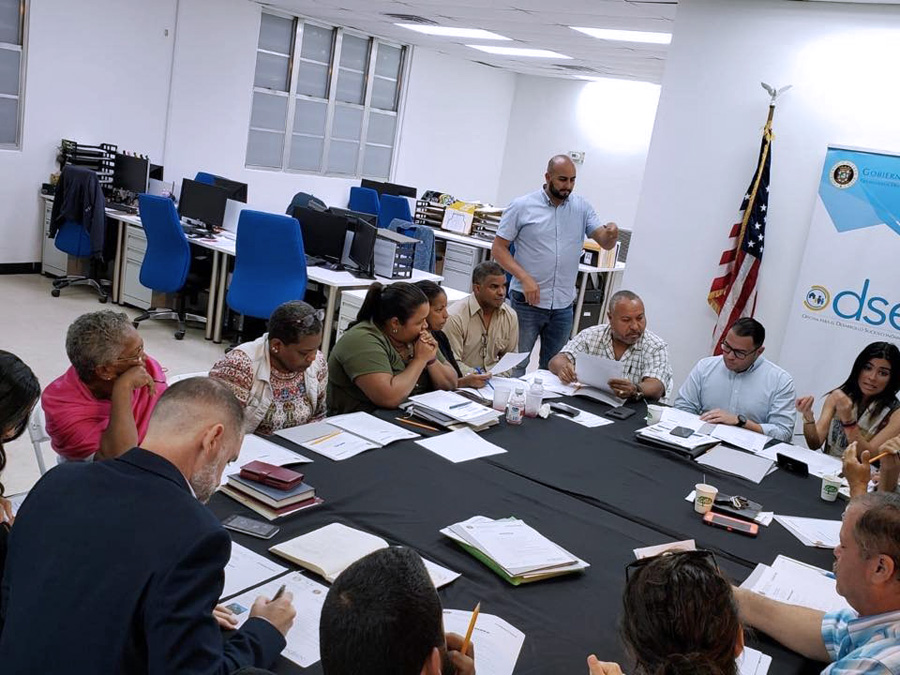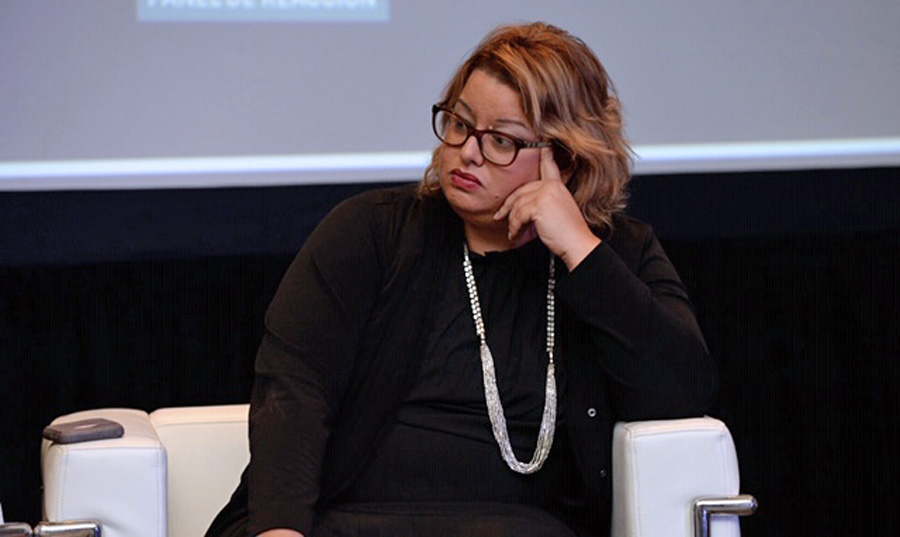Community distrusts gov’t call for Community Summit

By
Joel Cintrón Arbasetti | Center for Investigative Journalism
Gov.
Ricardo Rosselló’s administration is managing a Community Summit that will take
place on March 9 at the Convention Center.
“I
am aware that the Summit is going to take place, but they have not invited
me,” Orlando Serrano, community worker from the Salud neighborhood in
Mayagüez, said in mid-February.
“I
found out in the press. The leaders of the western area, San Germán, Mayagüez
and Añasco, none have been invited. I am going to participate to find out what
there is. But I’m not to be involved in things that are for the stands and
nothing is done,” he said.
“Prior
to the signing of Law 7, a summit called by [Popular Inc.’s] Richard Carrión
was held and nothing happened. It was a screen to tell us about the dismissals
; Marcos Rodríguez-Ema and Atilano Cordero-Badillo, were
there and what they did was make fools out of us,” Serrano said.
“We
are working in the Salud neighborhood in Mayagüez, where there are about 2,000
families. I’ve been here all my life, since I was 17 years old. This council of
residents has been here more than 30 years,” said Serrano.
Raúl
Maldonado, former Chief of Staff, mentioned the Community Summit to the Center for
Investigative Journalism (CPI, for its initials in Spanish) when asked how the government
plans to integrate the communities to the proposed developments as part of the Opportunity
Zones.
The
Opportunity Zones is a program of exemptions in federal taxes, excise taxes and
municipal patents, which seeks to make Puerto Rico more attractive to
investors. Ninety-eight percent of the island was declared an Opportunity Zone
under the Donald Trump tax reform, and local legislation that has not yet been
approved seeks to extend these benefits to local investors.
“What
you are saying is if the economic development will integrate communities that
have not been traditionally integrated into this type of development,”
Maldonado said. “Because you build a plant to manufacture, as was traditionally
done in Puerto Rico, and say ‘look, there’s work available,’ but there is no
link with the community.”
He
said the administration will present community leaders with the “iconic”
projects for Puerto Rico during the Summit.
Maldonado
told the CPI in December that the Summit will “address the 736 communities
in Puerto Rico and the 336 public housing projects to explain to community
leaders how they can make Opportunity Zones.”
Several
community leaders who have participated in the coordination meetings told the
CPI that they did not know of the Opportunity Zones concept and that the issue is
not on the Community Summit agenda.
The
official made reference to the Special Communities, but that office created by former
Gov. Sila Calderón was eliminated little by little by the subsequent Popular Democratic
and New Progressive party administrations, and there are currently few
organized community boards. Public housing complexes also do not have an
organizational structure or link with the government that allows them to
achieve a call as wide as the one Maldonado promised.
In
2017, Rosselló created the Office of Socioeconomic and Community Development
(ODSEC, by its initials in Spanish), which completely replaced what was left of
the Special Communities program (Office of the General Coordinator for
Socio-Economic Financing) created in 2001.
Information about summit spread as a rumor
The news that Community Summit was being organized came as a rumor to Mirta Colón-Pellecier, president of the Gladiolas Renace Residents Association. Two weeks ago, she joined the Summit meetings, after calling La Fortaleza to demand that the participation of public housing projects be taken into account.
“Two
months ago, it was a mystery, nobody knew that the Chief of Staff’s office was
behind this [the Community Summit] and it cannot be a community summit if the communities
are not there,” she said.
“It
was brewing from the Chief of Staff’s office and I find out because someone
tells me. The residences are communities, we are human beings who live
together. And we were not considered during the initial talks,” she said.
About
two weeks ago, Colón-Pellecier called the Chief of Staff’s office, which did
not have details of the Summit. The next day they called her and told her that
the Summit was being worked on by Hector Albertorio, director of La Fortaleza’s
Third Sector and Faith-Based organizations office. She then participated in a
meeting at ODSEC.
“There
they excused themselves for not having a way of communicating with me. We join
the work group and there was an interesting debate. The program was drafted,
the participation of the communities was worked on and [we demanded] that
action be taken in relation to the proposals presented. I do not want to waste
my time, I work out of commitment,” said Colón.
“Are the residences being called?” The CPI asked.
“I saw the Housing Department at the meeting, and that is their job. From my space we have been calling them; Yesterday we wrote letters [with other residents] about how to write public presentations,” she answered.
“We
are hopeful that what has been discussed with ODSEC will be fulfilled,”
said Colón.
The
event was scheduled for February but was postponed until Mar. 16. Now it has
been pushed ahead to Mar. 9, so that Gov. Ricardo Rosselló, Housing Secretary Fernando
Gil, Economic Development and Commerce Secretary Manuel Laboy, and the Education
Secretary Julia Keleher can participate, said Carmen Villanueva, community
leader of Hill Brothers in San Juan who has participated in the dialogue and who
is calling communities and public housing residents to the Summit.
On
March 4, the CPI asked the governor’s press secretary Denisse Pérez, to confirm
his participation in the Community Summit. She was also asked if the government
invested funds to promote the event, but there was no response.
“I
see it as more of the same. It’s like a media show, that’s why I do not really
want to go. It makes me very sad, because these people [the Government] do not
care about the communities,” said Modesta Irizarry, community leader of
Loíza.
Irizarry
recalled that for the Security Summit held by the government on Jan. 22, they
did not invite community leaders.
“Not
even me, and I live in Loíza, I work on the issue of violence and security and
I support the Police reform. If they care little about security, imagine what
will happen at this Summit,” she said.
Roberto
Thomas, coordinator of the Bahia de Jobos EcoDevelopment Initiative (IDEBAJO
for its initials in Spanish) in the southern part of the island, said there was
no prior consultation with the organization he represents and other community
organizations with which he has contact about the organization of the Summit.
Community
leader Villanueva believes the Summit will be a space “for the communities
to vindicate themselves.”
“The
Summit is the real ‘ opportunity zone’ among the communities, the government
and the housing complexes. Part of being together is that the community does
not participate in its own displacement,” Villanueva said.
“We
have to be there from the development to its implementation. The voice of the
community has not been present in the management of the funds and we must
insert the communities from the beginning and that it does not come from the
top down; that’s what makes the difference,” she said.
“What if the government listens to but does nothing?” the CPI asked.
“It will be documented if they listen to us and do nothing. There will be witnesses and it will be evident if the governor has credibility, and whether the recommendations are accepted. The majority will be called for an open and respectful dialogue, so that the development is not for a few instead of for many,” Villanueva said.
Management of CDBG-DR and Opportunity Zones funds raise suspicion
Thomas believes the threat of displacement of dozens of communities is on the table, for the projects without consultation that are proposed with the CDBG-DR funds and the Opportunity Zones.
“We
are evaluating participating [in the Summit] because we must about the spaces
that are opened. That the communities will be taken into account is not
reflected in the CDBG funds distribution plan that the Housing Department is
managing almost at a level of darkness and secrecy. So, if that is already
true, what effect will the Summit have? Unless they are open to changing their plan
when they listen to the communities. One is suspicious that [the Summit] is a
screen to say they complied,” said Thomas.
The
community leader pointed out that the Federal Emergency Management Agency’s new
flood maps “have not been evaluated by anyone but themselves, and coastal
areas with tourist status are declared to be flood-prone.”
“Then
the Foundation
for Puerto Rico, an entity that works the visitors economy, that is,
tourism, and that has nothing to do with the communities, is appointed to
manage the CDBG-DR funds,” Thomas told the CPI.
“This
is a recolonization plan for the island to submit it to a new economic plan
using as an excuse the reconstruction of Puerto Rico by the scourge of
Hurricane María. It is a matter of classes, you do not hear talk about removing
the communities of Ocean Park or Punta las Marías, where I had to go to look
for my brother after the hurricane with water up to my thighs,” Thomas said.
“But
none of those places is on the Housing Department’s list of [flood zones]. The
poor communities are taken out of the floodplains and then, due to a
millionaire investment, the area stops being flood-prone so that developers can
use it,” said Thomas.
Communities unaware of projects
Irizarry pointed out that many communities are unaware of the projects submitted by the mayors to be financed with federal government recovery funds.
“The
material is in English. If they really want the communities to know, they
should lower the level [of complexity],” she said.
“I
was at the first meeting [on the Community Summit] with Raúl Maldonado, which
was about CDBG funds. He was clear that there must be participation, but he
felt that he had everything ironed out because the government already had two
or three of the same community leaders,” she said.
“At
the first meeting there were only leaders from special communities and there
were disputes over representation by region. There a young government employee
boasted that they have excellent communication with community leaders and the
leaders had never seen him,” said Irizarry.
“I
know that there are guaranteed funds for the reconstruction, you have to see
who is going to manage them, whether it’s the Fortaleza Office or the
Foundation for Puerto Rico. What community participation is there within that
organization? Because they name two or three, and do not consult with the
communities,” said Serrano.
At the event, there will be “work tables” moderated by community leaders.












